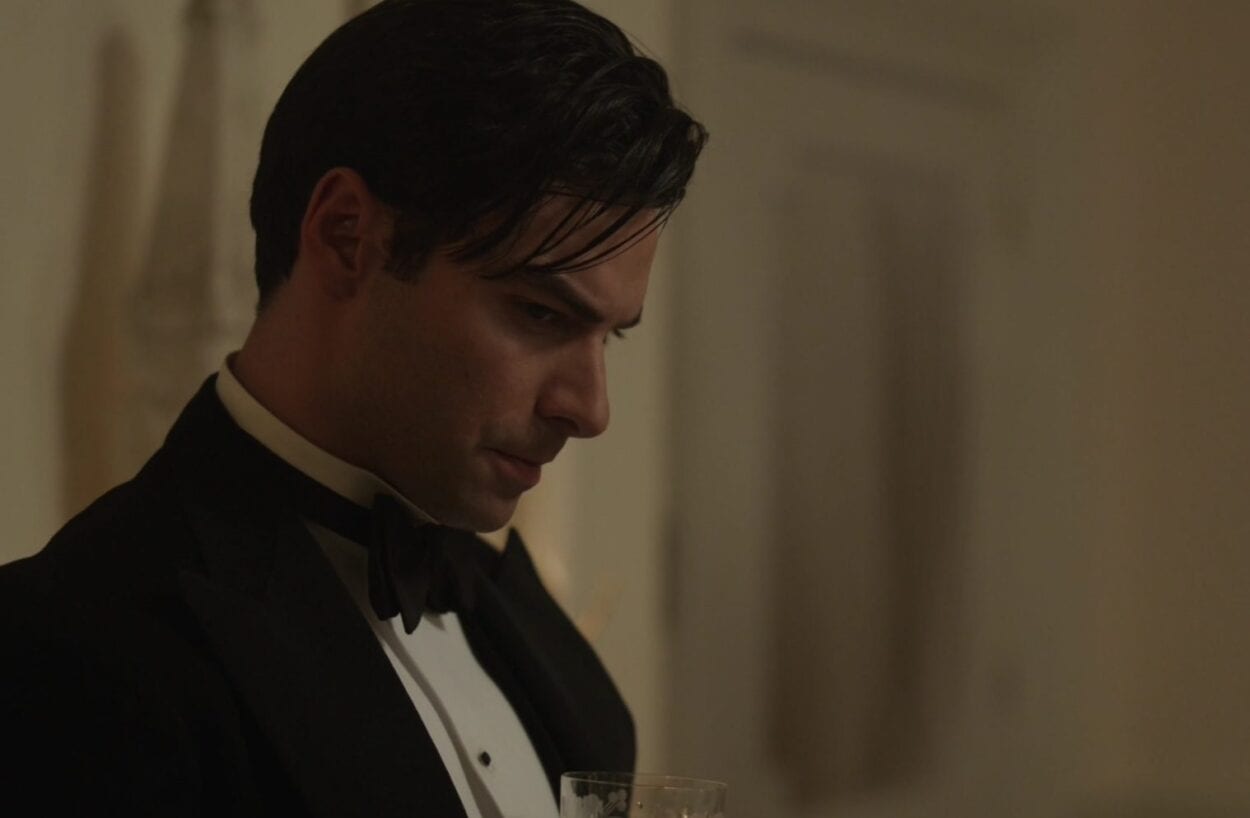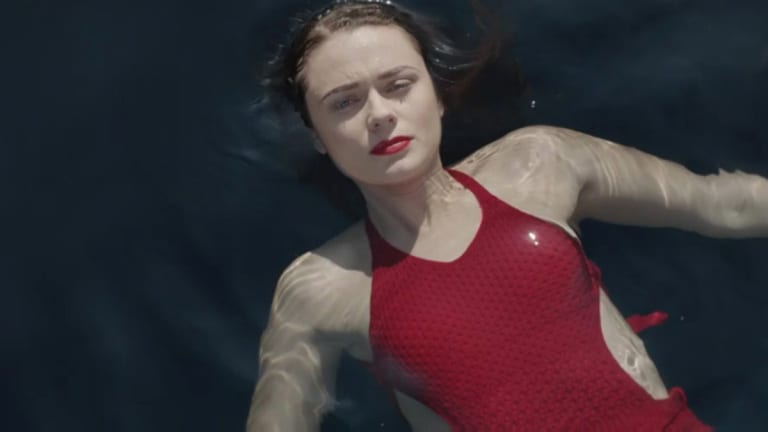Agatha Christie’s And Then There Were None graced our television screens with a BBC adaptation around Christmas of 2015. Although there have been numerous attempts to recreate the story for the screen, this one is by far the best. From casting and colours right down to wit and nuance, the three-part limited series managed to do justice to the 1939 novel, whilst also feeling fresh and relevant. And Then There Were None is the world’s bestselling mystery novel, having sold over 100 million copies and being translated into several languages. This article will contain heavy spoilers for the book and limited series, especially regarding the storyline of Philip Lombard (Aiden Turner) himself, although I won’t actually ruin the ending—I promise.
The mood, settings, and costumes all come together to make something visually stunning. One of my favourite visual messages from the series is the foreshadowing throughout. The first time we see Vera Claythorne (Maeve Dermody) she is sat on the train under a window that’s blind cord looks suspiciously like a noose, and, upon arriving on the island, Justice Wargrave (Charles Dance) is at the back of the line of guests. He looks almost like he is herding his peers with his cane (which is of course just for show, as later on we see him running freely into the sea without the hint of a limp). There are also repeated shots of a ceiling hook and glass figurines–both before they become key plot points.
The premise of the story is that ten people, all from vastly different backgrounds, are invited to Soldier Island. None of them have met the owners of the island and they have all been invited there by letter under different pretenses. However, they soon begin to die one by one, and it is up to themselves to figure out what and why this is happening.
Lombard is by far the most mysterious person on the island. While most were invited to the island for fairly benign reasons—one had been hired as a secretary, one as a party guest, and so on—Lombard was invited to “keep an eye on things”, and asked to bring a gun. He also has the most sordid and hazy backstory. We learn very early on that Lombard has killed 21 men, something he admits to quite freely. This article will examine how his key traits were exaggerated for this adaptation, and how this portrayal made him an even more compelling character than he already was. It is my personal opinion that this adaption makes him the most memorable character from the whole story.
On-screen, Lombard’s character remains largely unchanged from the novel (although the addition of smoldering glances, an Irish accent, and undone shirt buttons are used to really drive home the fact that Lombard is an attractive man). The Lombard we see is also more humorous and more callous than the one Christie described. It seems there were three main traits the screenwriters pulled apart when adapting Philip Lombard: intelligence, courage, and charm. These were portrayed as his main characteristics, amplified to give him his compelling nature.

This particular adaptation did well to play up these traits, creating one of the most complex and intriguing characters that I have ever seen. There were really only two options for the ‘has-it-all compelling male character’ in this story. Lombard and Blore (Burn Gorman) are the only two young and reasonably fit men; and Blore somewhat lets himself down with his muttering, embarrassment, and his rage. For these reasons it does make perfect sense that it is Lombard who is the most compelling character of the story—he has all the ingredients to be perfectly perfect.
The first focal trait Lombard has—his intelligence—paints him as someone who is difficult to dislike. Christie originally wrote Lombard as someone with “quick-moving eyes”, an “active” brain, and natural curiosity and discipline. He is aware of his environment—always listening and asking questions. One of the fellow characters says, “Lombard was no fool”, just in case we hadn’t already picked up those cues. He quickly becomes dominant within the group, and others turn to him for advice and with concerns. Despite being the only person who admits to murder, he is the person the group turns to for leadership. Perhaps, as the other characters know internally that they are also guilty of causing death, they look up to him for his honesty and see him as better than themselves—someone they are able to trust and whose intelligence will be useful to them.
When it quickly transpires that all ten people on the island are being accused of heinous crimes—all involving direct or indirect murder—Lombard is the only one to admit that the accusations against him are true. This gives us a conflicted opinion of him. Straight away we know that he is dangerous, but his openness and his honesty are admirable and make him seem trustworthy. This is something the televised adaptation handled very well. The people around him always look to him for authority, and, although some are disgusted by his confession, they still admire the brutal honesty he speaks with. The dialogue in this particular scene is undeniably brilliant. The writers not only give us Lombard’s bold, dignified confession but also introduce us to his wit—something I will touch upon later.
Lombard maintains a very measured, calm character throughout his time on Soldier Island. Although at times he raises his voice and we see him mocking the other characters for their frailty, he is the only one who never seems to break under the pressure—with the exception of those killed early on, who were never really given the opportunity. He is self-assured, not relying on anybody else or their opinions. His control and strength—two traits we also associate with attentiveness and consequently intellect—are shown to us throughout.
We know from his actions that he is always aware of his surroundings, and his grounded nature is shown well, without being explicitly noted. When the situation on the island becomes dark, he is the only character who doesn’t experience flashbacks and remorse regarding their actions. He is always curious about his surroundings, he has a supreme sense of self-control, and he is mature in juxtaposition to Marsten (Douglas Booth), whom he spends a lot of time with in the opening scenes. He is also the only character to point out that the situation “serves [them] all right”, and he laughs at his past catching up with him. He accepts the situation that they are in, and instead of becoming weak and frightened, he thinks calmly and rationally to do what he can for himself. He is, by nature, a problem solver.
Secondly, it is Lombard’s courage that sets him apart from the other characters. He possesses confidence in himself and bravery that goes beyond what we see reflected in anybody else. His personality is not skin-deep but penetrates his entire being. You feel his honesty and his courage, leaving the traits of the other characters feeling superficial and mundane in comparison. His sharpness and passion are immediately visible. Christie wrote that Lombard’s eyes were “amused” as he told his peers that he had indeed killed 21 men. This was conveyed superbly into the screen adaptation—Turner manages to look both amused and disinterested, giving the character this air of confidence and bravado that seeped off the pages and made the story what it is.
And he of course has the gall to theorize about Judge Wargrave’s intentions when no-one else dares to. Christie wrote him the line “dangerous? Who’s afraid of the big bad wolf? I’ll be dangerous when I get a hold of him”, and, although not quoted, this sentiment is proudly displayed. Twice in scenes where the characters are working on things together, Christie writes “Lombard’s progress” as the task progresses. It is very clear that he was written to be a leader, and it is his courage that allows him to be one. When he takes control and the group trusts him to lead. At crucial points Christie also describes Lombard as the “first to move”, and later, “again it was Lombard who acted”. She tells us also how he “climbs like a cat” and it is clear that the other characters look up to him and they admire him.
On-screen this is portrayed well—physically and mentally he is always shown to be a step ahead, and he has the courage to move confidently and speak with a self-assuredness that none of the other characters seem to manage. But, I think the most glaring scene to discuss when it comes to Lombard’s boldness is the scene directly after the gramophone recording has been played. As all the characters are making excuses for why their names show up on the record, Lombard declares that his indictment was “pin-point accurate”. He says in an authoritative voice, “I’m the only one telling the truth in a room full of liars”. This cemented him early on as the most honest, most trustworthy peer, despite his violent past. He dares to speak out and challenge those around him, even in a situation where he is the only one willing to do so and when it would be easy for him to lie along with them.
On their final night on the island, Lombard and Claythorne were closer than ever. Dancing with her, he says, “death is for other people, not for us”. The two seem like kindred spirits at this moment—she inspired by his own confidence.

Last but not least, we have Lombard’s charm. His charm is perhaps the first thing that jumps out about his character. In the book, Christie makes three references to his attractive physical appearance in the first three chapters alone. We can’t consider this aspect of the character without in turn recognising his casting. The BBC cast Aiden Turner in this role just nine months after the launch of Poldark, a show which made Turner a national sex-symbol. Christie also made Lombard physically strong, practical, thoughtful, and gave him a “pleasant easy voice” and an “easy laugh”. The BBC and Turner gave us all of these things and more.
There is more to unpack when discussing his charm than the previous two traits. For one, ‘charm’ can mean many things and can be difficult to define cleanly. In this case, Lombard’s charm boils down to his honesty, wit, and physical appearance. There is no doubt this charm was played up to create a character you couldn’t help but find attractive.
We have already touched upon Lombard’s honesty, but it comes into play here too. Not only does it make him admirable, but it makes him charming, desirable even. He becomes more compelling the more we look. It has already been noted that when Lombard confessed to his murders he does so with candour and whimsy, but I am yet to touch upon the visuals we are given at this point. As he describes his war crimes, we see a shot of him walking away from the scene, t-shirt ripped down the front, slow-motion, and smoke billowing across his face. It is a romanticised depiction of the horrors of war, glorifying Lombard for his steel.
Another thing Lombard has is wit. All the way through his dialogue is littered with quips, dark one-liners, and sarcasm. When Armstrong (Toby Stephens) speaks about his medical care role, Lombard mutters, “gave up on the surgery then doctor?”. Many of these lines are not present in the original writing of the book, so we can see once again that for this adaptation he has deliberately been written as a likable character. Regardless of his past, we are encouraged to find him charming. Humour is a sure-fire way to give charm to any character, and one who is already distinctly attractive barely needs it.

Thirdly, Lombard is the physical archetype of a dreamboat. Lombard’s sexuality is really played up to make him appear as desirable and compelling as possible. In the novel, there is some mild flirtation with Vera, but Philip’s focus is always on “solving the mystery/puzzle”, as it were. In this adaptation, although this remains his focus—indeed it is everybody’s focus—Lombard and Claythrone’s relationship does become physical. They were both written by Christie as attractive characters. The first time they see each other, Lombard is ‘checking out’ Claythorne in a train carriage—a detail kept in the screen version. However, this is taken further. There is continued emphasis on his sexuality which ends up creating the male embodiment of a femme fatale. Later on, we are also treated to a sensual dancing scene that did not exist in the book, as well as a sexual relationship between Lombard and Vera Claythorne, another guest on the island. This was really taken on board for the screen, and the relationship written for the two fits perfectly into the tale. Although it was not intended by the author for this romantic element of the story to exist, I think it does an excellent job of cementing Lombard as the charming, admirable man audiences are presented with.

There is something else of note when it comes to playing on our sympathies. Lombard’s death is portrayed as a much more tragic demise than the one you might read. Creating a romantic relationship between Vera and Philip makes her need to kill him even more heartbreaking. The shooting itself is also more dramatic than in the book. Several shots are fired instead of just one, and we watch him suffer in disbelief. Lombard, the character woven from intelligence, confidence, and great charm, is dying at the hands of his lover.
Finally, Lombard has an edge over his peers when it comes to negative attributes. The negative traits attributed to him by Christie have been transferred to other characters. His racism is given to Blore, and Brent is an anti-semite—although in the original version both of these traits belonged to him. This final nail in the coffin gives Lombard the full package. Yes, perhaps he has done terrible things, but his redeeming qualities (and lack of despicable ones) make for a very charming man indeed. But, at the end of the day, if his charm had been enough for Vera they might both have survived their ordeal.


Philip Lombard’s character was slightly whitewashed for this adaptation. I suspect that it had something to do with Aidan Turner starring in “Poldark” at the time it originally aired.